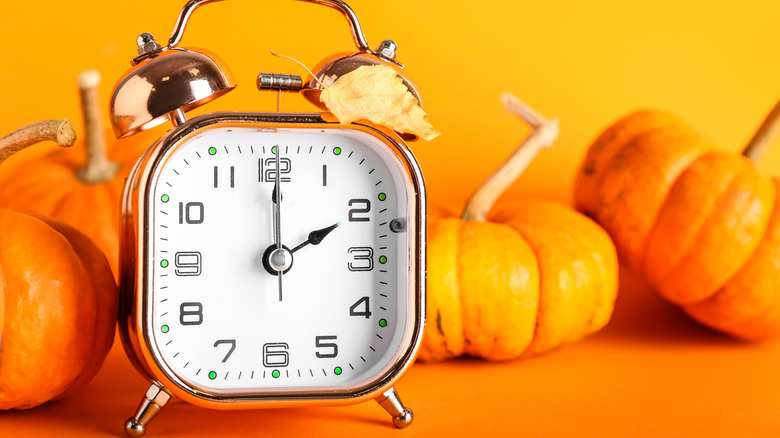As You Get Ready To Turn Back Your Clocks — Here's How It Will Affect Your Appetite
We may receive a commission on purchases made from links.
For over a hundred years, most Americans have been springing forward an hour each spring and falling back an hour each fall. As a result, many of us (save for states like Hawaii and Arizona, with the exception of the Navajo Nation) lose or gain sleep in order to have more daylight during summer evenings. This fluctuation may seem minor, but the way it affects our circadian rhythms can impact everything from mood to appetite. A study conducted between 2004 and 2010 found that many people consume more snack foods in the days before and after daylight saving time shifts.
The abrupt change in time and shift in natural light can wreak havoc on a person's circadian rhythm, which is our 24-hour sleep and wake cycle. It can take up to a week for a person's system to get back on track after the clocks fall backward or spring forward. During this week, the fluctuations in sleep can lead to hormones not doing their jobs as efficiently.
Ghrelin is the hormone that increases cravings, and leptin is responsible for your feeling satiated. When our circadian rhythm is impacted by a time change, it can lead to overeating until it's back to normal. In other words, if you can't stop eating junk food, try monitoring your sleep. For most people in the United States, there's no avoiding the time change, and it impacts more than just our eating habits. However, you don't have to endure it unprepared each time.
How you can minimize the impact of Daylight Savings on your body
Our internal clocks don't seem to like daylight savings time, and we can't trick our brains around food, but there are ways to prepare for the inevitable grogginess that comes with the time change. One of several ways to help mitigate the whiplash of daylight savings time is to maintain a healthy sleep schedule. This is usually easier said than done, but going screen-free before sleeping, avoiding caffeine in the afternoon or evenings (thought drinking coffee at night isn't so strange), and attempting to go to bed at a decent and consistent hour are great ways to start. Another helpful action is to wake up to morning light. Morning light helps reset the circadian rhythm, and if you're without natural light, there are alarm clocks like the Hatch Restore that simulate waking with the sun.
If you remember far enough in advance, start changing your sleep and wake times gradually in the days leading up to falling back or springing forward. Instead of an abrupt hour-long loss or gain, your body will already be prepared to face the change, and week one won't be as bad. If you need some ideas for a pre-bedtime snack that will help you ease into a new sleep schedule, foods like tomatoes, pistachios, and grapes have natural melatonin, a hormone that aids in sleep. And it's important to remember that proper sleep will positively impact our bodies whether it's daylight savings time or not.

